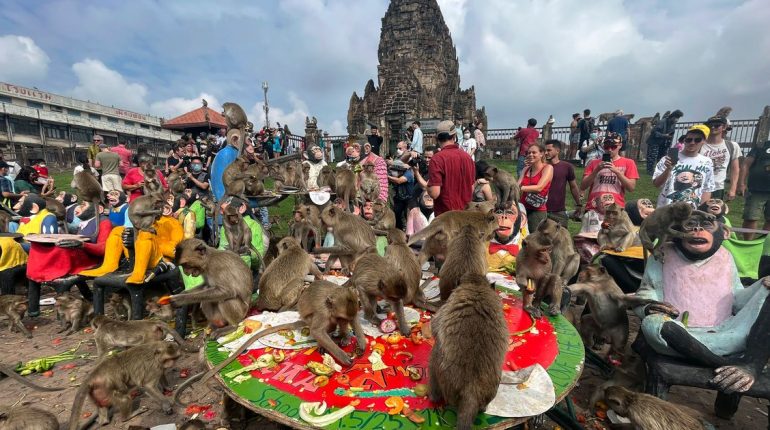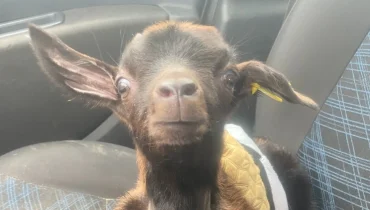Lopburi’s Monkey Mayhem: A Comprehensive Plan to Restore Harmony

Posted April 12, 2024 by: Admin
In the central Thai city of Lopburi, a long-standing conflict between humans and macaques has reached a boiling point. The monkeys, which have become a symbol of local culture and a major tourist attraction, have been increasingly aggressive in their interactions with residents and visitors, frequently attempting to snatch food and causing injuries in the process.
The macaques of Lopburi have long been revered as a symbol of the city’s unique identity. Tourists flock to the ancient Three Pagodas temple to witness the annual “Monkey Buffet” festival, and the monkeys are a common sight throughout the city. As a protected species under Thailand’s wildlife conservation law, the macaques have enjoyed a privileged status in Lopburi.
However, the human-monkey conflict has escalated in recent years, with numerous instances of monkeys snatching food from unsuspecting individuals. These encounters have led to scratches, bites, and other injuries, causing growing concern among residents and visitors alike. The situation reached a tipping point in March when a woman dislocated her knee after being pulled off her feet by a monkey, and a man was knocked off his motorcycle by another hungry primate.
Efforts to control the monkey population have been ongoing since 2014, with wildlife authorities neutering approximately 2,600 Lopburi macaques over the past decade. However, these measures have proven insufficient in curbing the problem. Attempts to limit feeding areas have also had unintended consequences, with dominant troops monopolizing the designated spots and leaving rival bands hungry and more likely to harass humans for food.
Recognizing the need for a more comprehensive approach, Thai wildlife officials have laid out a plan to bring peace to Lopburi. The Department of National Parks, Wildlife and Plant Conservation, led by Director-General Athapol Charoenshunsa, aims to round up some 2,500 urban monkeys and place them in massive enclosures. In collaboration with wildlife experts, they will also work to find a way for a limited number of monkeys to remain at liberty within the city.
The monkey catching campaign has already begun, with a focus on capturing the more aggressive alpha males. Thus far, 37 monkeys have been caught and placed under the care of wildlife authorities in the neighboring province of Saraburi, while others have been sent to the Lopburi zoo. Officials plan to capture the remaining monkeys, particularly those in residential areas, once the enclosures are complete. To prevent inter-troop conflicts, separate cages will be prepared for different monkey groups.
Athapol expressed confidence in the plan’s ability to swiftly resolve the issue, stating that the first phase of the operation is expected to begin within weeks. The massive cages, designed to accommodate thousands of monkeys, are seen as a key component in bringing the situation under control.
Addressing the root causes of the human-monkey conflict, authorities have acknowledged the role of tourists and residents in feeding the monkeys, which has contributed to their growing numbers and habituation to human food sources. However, Athapol emphasized that people should not view the monkeys as villains, suggesting that the authorities may not have been efficient enough in their efforts to control the simian population. Phadej Laithong, director of the Wildlife Conservation Office, highlighted the need for humans to adapt to the presence of macaques, noting that a lack of natural food sources drives the animals to seek sustenance from humans.
The monkey mayhem in Lopburi is not an isolated incident, as 52 out of Thailand’s 77 provinces report frequent problems with monkeys. Authorities are also working to address monkey-related concerns in other areas, such as Prajuab Kiri Khan and Phetchaburi, demonstrating the widespread nature of the issue.
In conclusion, the comprehensive plan to restore harmony between humans and macaques in Lopburi underscores the importance of finding a balance between wildlife conservation and public safety. As the city embarks on this ambitious endeavor, it has the potential to serve as a model for other regions grappling with similar challenges. With a combination of strategic interventions and a shift in public perception, there is hope for a future where Lopburi’s residents and macaques can coexist peacefully, preserving the city’s unique cultural heritage while ensuring the well-being of both human and simian populations.
















